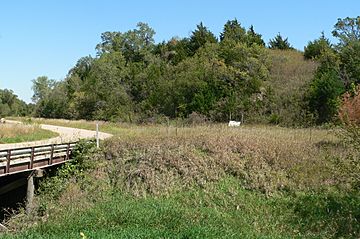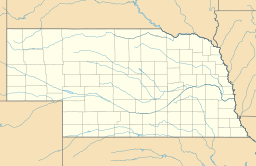Guide Rock (hill) facts for kids
Quick facts for kids Guide Rock |
|
|---|---|
| Pa-hur | |

Guide Rock, seen from the west. The bridge in the left foreground crosses Rankin Creek.
|
|
| Highest point | |
| Elevation | 1,713 ft (522 m) |
| Geography | |
| Location | Webster County, Nebraska, United States |
Guide Rock is a special hill in south central Nebraska, United States. The Pawnee call it Pa-hur or Pahur. For the Pawnee, this hill was one of five places where powerful spirit animals lived.
In 1806, two important trips happened near Guide Rock. One was led by Facundo Melgares from Spain, and the other by Zebulon Pike from the United States. Both visited a large Pawnee village nearby. Pike convinced the Pawnee to take down a Spanish flag they had received and put up an American flag instead.
The English name "Guide Rock" was later given to the nearby town of Guide Rock, Nebraska.
Contents
About Guide Rock
Guide Rock is found in Webster County, Nebraska. It is southeast of the town that shares its name. The hill sits on the south side of the Republican River and just east of Rankin Creek.
People describe Guide Rock in different ways. The United States Geological Survey calls it a "pillar." This means it's a tall, standing, natural rock shape. One local writer said it was a "vast rocky bluff." However, a geology book says it's more like a "loess bluff" (a hill made of fine soil) and not really a rock.
These different descriptions might be because the hill has changed over time. Reports from 1973 said that four of the five sacred Pawnee places, including Guide Rock, had been greatly changed or even destroyed.
Pawnee Beliefs About Guide Rock
In the traditional Pawnee religion, the main spirit, Tirawa, gives special powers to certain animals. These animals are called nahurac. They work for Tirawa, sending messages and helping the Pawnee people.
The nahurac had five special homes or lodges. The most important was Pahuk, which means "hill island." This was a bluff near Cedar Bluffs, Nebraska on the Platte River.
Other lodges included:
- Lalawakohtito, or "dark island," on the Platte River near Central City, Nebraska.
- Ahkawitakol, or "white bank," on the Loup River in Nance County, Nebraska.
- Kitzawitzuk, or "water on a bank," also called Pahowa by the Pawnee. This was a spring on the Solomon River near Glen Elder, Kansas. Today, it is known as Waconda Spring and is under the water of Waconda Reservoir.
The fifth lodge of the nahurac was called Pahur by the Pawnee. This name means "hill that points the way." In English, this name was shortened to "Guide Rock."
History of Guide Rock
The Pawnee Village
The Pawnee people often built their main villages close to the homes of the nahurac. A large village of the Kitkehahki, or Republican Pawnee, was located a short distance upstream from Guide Rock. This village was used off and on from about 1770 to 1830.
After the Louisiana Purchase in 1803, the United States and Spain disagreed about where the new border was. Spain thought most of the land west of the Mississippi River belonged to them. In 1806, Spain sent a large group of over 600 men, led by Lieutenant Facundo Melgares, from Santa Fe. Their goal was to impress the Native American tribes and get them to support Spain against the United States.
The United States also sent an expedition in 1806. General James Wilkinson sent Zebulon Pike and 23 men to explore rivers and make peace between Native American tribes.
Melgares and 360 of his men arrived at the Guide Rock Pawnee village. They gave gifts and a Spanish flag to the villagers. They asked the Pawnee to stop anyone from the United States from traveling west into Spanish lands. After this, they returned to Santa Fe. Their trip failed partly because the Pawnee did not fully cooperate.
Pike's group arrived at the Guide Rock village on September 25, 1806, a few weeks after Melgares left. They stayed for almost two weeks. While there, Pike convinced the Pawnee to take down the Spanish flag and put up an American flag. He let the Pawnee keep the Spanish flag but asked them not to fly it while he was there.
When Pike was ready to leave, the Pawnee told him they would stop him from going further west. Melgares had asked them to do this. Also, the Pawnee did not want the United States to become friends with their enemies, the Comanche. Pike refused to be stopped. He made it clear that his group would fight if needed. In the end, the Pawnee allowed Pike's expedition to continue.
The Town of Guide Rock
The first group of settlers to claim land in Webster County built their homes on the north side of the Republican River. Eight settlers voted, and they all agreed to name their new town Guide Rock, Nebraska after the special hill nearby.
Today, an annual festival is held in the town of Guide Rock. It is called "Pa-Hur Days" to honor the hill's Pawnee name and history.
 | DeHart Hubbard |
 | Wilma Rudolph |
 | Jesse Owens |
 | Jackie Joyner-Kersee |
 | Major Taylor |



